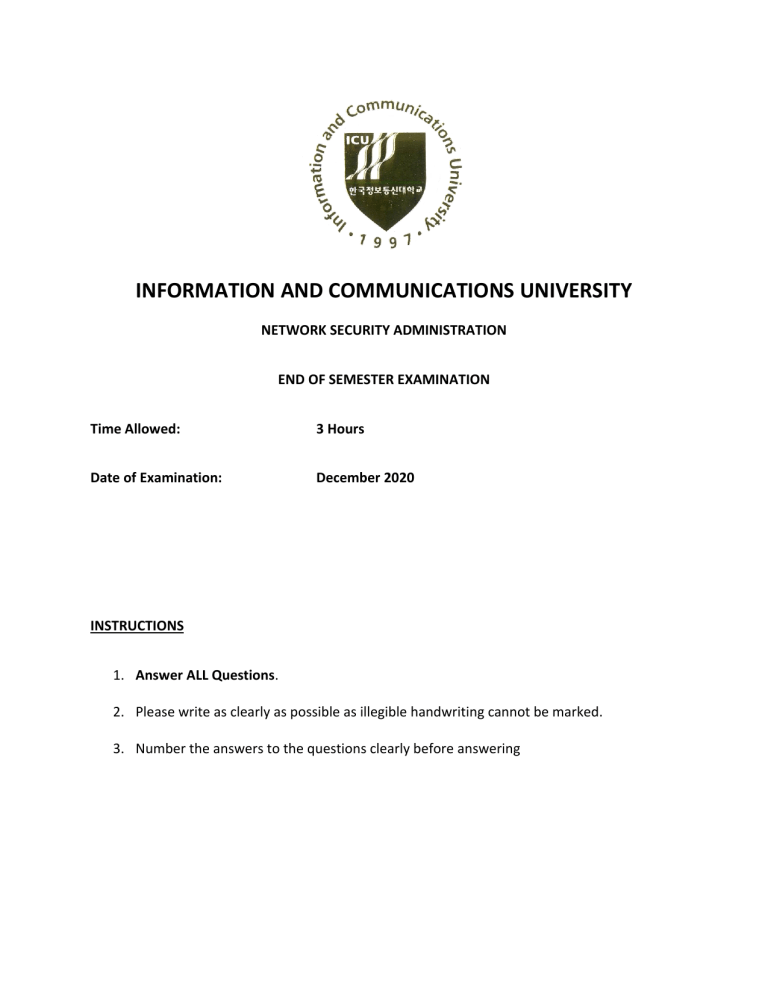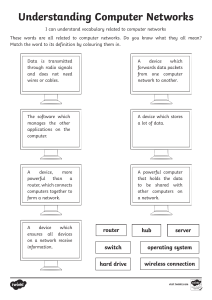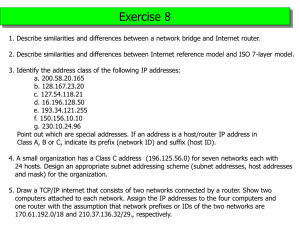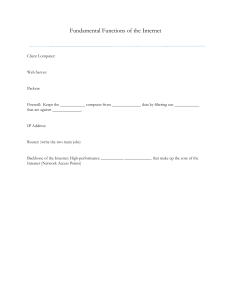
INFORMATION AND COMMUNICATIONS UNIVERSITY NETWORK SECURITY ADMINISTRATION END OF SEMESTER EXAMINATION Time Allowed: 3 Hours Date of Examination: December 2020 INSTRUCTIONS 1. Answer ALL Questions. 2. Please write as clearly as possible as illegible handwriting cannot be marked. 3. Number the answers to the questions clearly before answering Question 1: Figure 1 displays a network with one Cisco router and two directly attached Ethernet interfaces. Use Figure 1 to answer the following questions. Figure 1 Diagram 1 In Figure 1, PC1 cannot communicate with PC2. What is the likely cause of the problem assuming that the router is configured correctly? a. Router R1 requires a routing protocol to route packets from Ethernet0 to Ethernet1. b. There is a problem with the IP address configuration on Router R1. c. The gateway address on PC1 is wrong. d. The gateway address on the router is wrong. 2 In Figure 2-21, what will be the ping response display when an exec user on Router R1 pings PC1’s IP address for the first time? Assume that all configurations are correct. a. !!!!! b. !!!!. c. ..... d. .!!!! e. .!!!!! 3 What IOS command was used to display the following output taken from Router R1? a. show ip arpa b. show ip arp c. show interface ethernet0 d. show interface ethernet1 Question 2: This scenario uses a configuration taken from a working Cisco IOS router and tests your skills with DNS, TFTP, NTP, and SNMP. Figure 2 displays the configuration of a Cisco router named R1. Figure 2 R1 Running Configuration 1 What happens when a network administrator types the host name Router1 at the router prompt? (Select the best two answers.) a. DNS queries are disabled; nothing will be translated. b. The name Router1 is mapped to the IP address 131.108.1.1. c. The administrator could also type CCIE to reach the same IP address (131.108.1.1). d. Because DNS is disabled with the command no ip domain-lookup, the router assumes this is an invalid IOS command and returns the error “% Unknown command or computer name, or unable to find computer address.” e. Local DNSs are case-sensitive so you can only type Router1 to map to 131.108.1.1. 2 The following commands are entered on the router named R1. What are the TFTP server address and TFTP filename stored on the router on board flash? R1#copy tftp flash Address or name of remote host []? 150.100.1.253 Source filename []? c2600-jo3s56i-mz.121-5.T10.bin Destination filename [c2600-jo3s56i-mz.121-5.T10.bin]? c2600-c1 3 R1 supplies an NTP clock source to a remote router. What is the NTP’s peer IP address, and what is the MD5 password used to ensure that NTP sessions are authenticated? 4 What is the SNMP read-write access community string for the following configuration? snmp-server community public RO snmp-server community publiC RW Question 3: Figure 3 displays a simple one-router network with two Ethernet LAN interfaces connecting users on subnet 131.108.1.0/24 to the server IP network, 131.108.2.0/24. Figure 3 Physical Topology Figure 4 displays the working configuration file on R1 numbered from line 1 to 25. Figure 4 R1’s Full Configuration 1 The network administrator enables the debug ip packet command on Router R1, but no output is seen when connected to the console. IP traffic is following correctly from Ethernet0/0 to Ethernet0/1. What is the likely problem? What IOS configuration change is required to rectify the fault? 2 There are a number of configured aliases. What alias will display the Ethernet interface statistics for the Ethernet interface labeled Ethernet0/1? 3 When the following command is entered at the privilege EXEC prompt, what will the output be? R1#eth0 4 What is the password of Router 1 that enables a network administrator to make configuration changes? 5 What debug command can be used to debug IP packets’ source from the address 131.108.2.100 to the PC with the IP address of 131.108.1.100. 6 A user telnets to Router R1 and runs the debug command, debug ip packet. IP data travels from the PC to the server but no output is displayed on the router. What is the likely problem? R2#R1 Trying 131.108.255.1 ... Open R1>debug ip packet ^ % Invalid input detected at '^' marker. R1> 7 What is the configuration register of the router in Figure 4-6? 8 What is the VTY password required for Telnet clients logging into R1? 9 What does access list 1 accomplish in line 12? 10 What Global IOS command would encrypt all passwords configured on R1 in Figure 4-6? Question 4: Figure 5 displays a typical two-router topology with an external connection to the Internet via R1. Figure 5 Two-Router Network Attacked by External Intruder In this scenario, a Cisco IOS router is subjected to ICMP, TCP, or UDP IP packets. The network administrator is not sure of what type but notices the log file that is buffered to the Router R2 has just increased from 1 MB to 2.5 MB in less than 5 seconds. What can be done to characterize the traffic and detect the type of denial-of-service attack?


